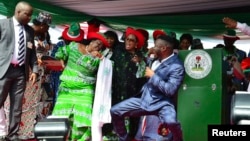Two years of political upheaval culminate Saturday as Nigeria holds crucial elections Saturday and the ruling People’s Democratic Party faces its first real challenge since coming to power at the end of military rule in 1999.
The ruling party, backing incumbent Goodluck Jonathan, has a formidable opponent in the main opposition party, the All Progressives Congress, which is backing Muhammadu Buhari, a former military ruler.
At least three regional parties came together in February 2013 to form the mega-opposition party -- a first for Nigeria. Naysayers predicted the new party would implode, but then prominent ruling party members started jumping ship for the Congress.
Five governors came on board at once, then 37 representatives, then 11 senators.
The momentum stalled last year as the People's Democratic Party rebounded, with a new party leader and efforts to reconcile. The defections also started going both ways.
This back and forth continues even now with just days to go before presidential and parliamentary elections. The two parties keep gaining and losing members.
The results of the March 28 vote could kick off another wave of party-swapping ahead of governor and state assembly races April 11, analysts said.
“You find people jumping ship quite unashamedly to the party of the president-elect,” said Dawn Dimowo, a political analyst at the strategy firm Africa Practice in Abuja.
The ground the All Progressives Congress, known as the APC, broke in Nigerian party politics had a lot to do with good timing.
“They were able to capitalize on the fact that there was disenchantment within the (ruling party)," Dimowo said. "There were people who were ready to quit the party and move to the APC. So it got a big boost from that."
One of the main points of contention: whether Jonathan's party had broken an agreement to rotate the presidency between the north, where the population is poorer and largely Muslim, and the south, which is largely wealthier and mainly Christian.
Some within the ruling party believed the north was owed another term when Jonathan, a southerner, ran and won in 2011.
Nigerian political scientist Kabir Mato said the opposition coalition is riding a sea change.
“Citizens are gradually inching away from the traditional politics of ethnicity, religion and regionalism to a politics of dividends of democracy…" Mato said. "So I think it’s simply the desire that there should exist an alternative that could give a platform for people in the event that we are dissatisfied with what’s happening here."
Jonathan has brushed off the defections. Such is politics, he told reporters in a televised media chat in February.
“There [are] no permanent friends. There [are] no permanent enemies. There are permanent interests,” he said.
The All Progressives Congress has a majority in the House and holds 14 out of Nigeria’s 36 governors.
But Jonathan has the incumbent advantage. The ruling party is also seen as having benefited from the six-week election postponement over security issues in the north. But the vote still looks too close to call.
Buhari dominated the mostly Muslim north in the 2011 vote but did poorly in the south. His opposition backers have campaigned hard there this time, with Buhari swinging through the region again this week.
Political analyst Dimowo said the southwest tops her watch list.
“He’s going to pick up a lot more votes in the south this time around than he did in 2011 and that’s eroding the PDP’s base. So it’s quite exciting to see what is going to happen,” she said.
The All Progressives Congress has cast this election as a referendum on 16 years of PDP rule: its symbol is a broom and it is pledging a clean sweep.
Some wonder, however, how much of an alternative the APC really is. There are some PDP old guard in this new party, and probably more will join if Buhari wins.




